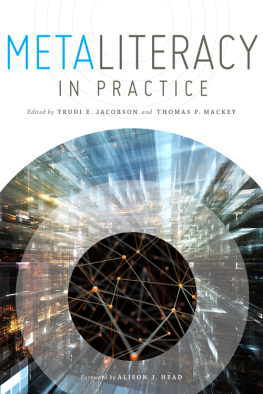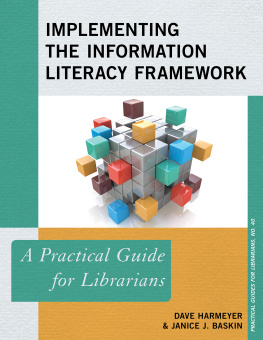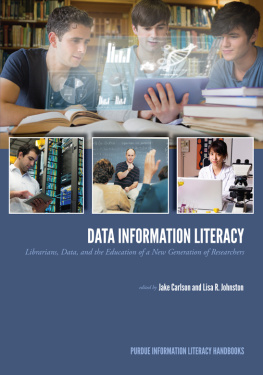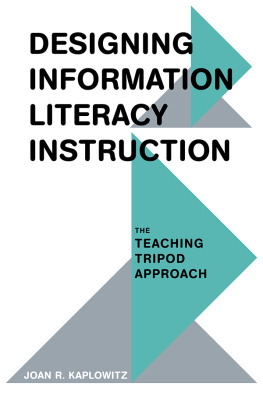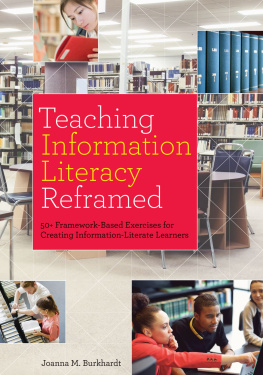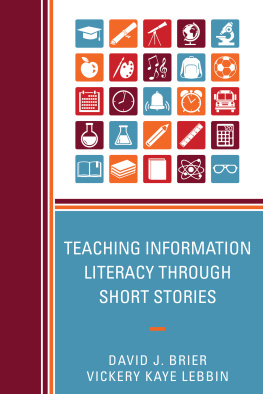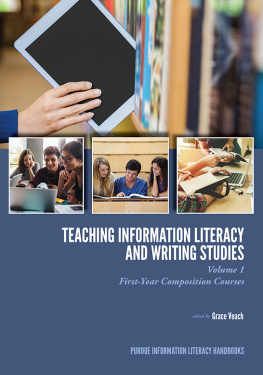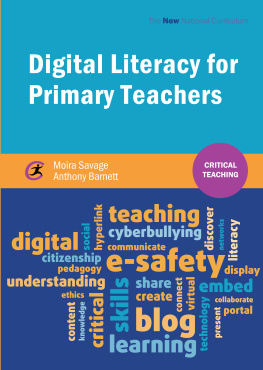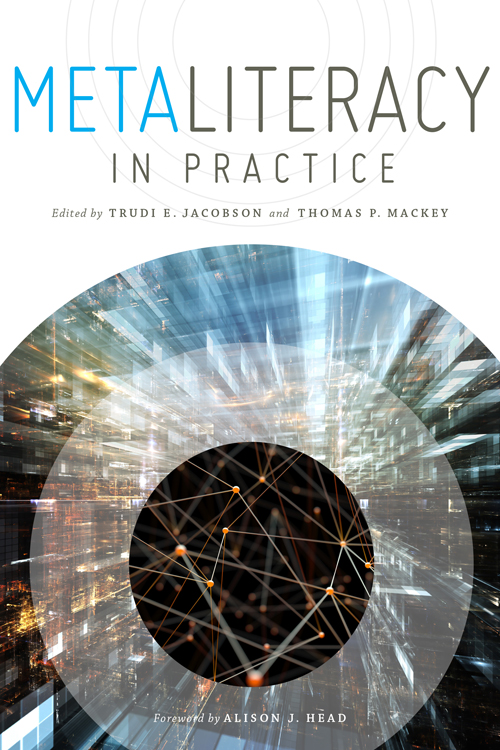
ALA Neal-Schuman purchases fund advocacy, awareness, and accreditation programs for library professionals worldwide.
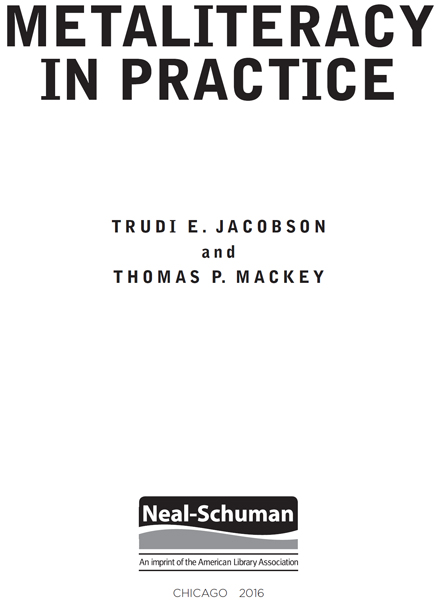
2016 by the American Library Association
Extensive effort has gone into ensuring the reliability of the information in this book; however, the publisher makes no warranty, express or implied, with respect to the material contained herein.
ISBNs
978-0-8389-1379-6 (paper)
978-0-8389-1387-1 (PDF)
978-0-8389-1388-8 (ePub)
978-0-8389-1389-5 (Kindle)
Library of Congress Cataloging-in-Publication Data
Names: Jacobson, Trudi E., 1957- editor. | Mackey, Thomas P., editor.
Title: Metaliteracy in practice / edited by Trudi E. Jacobson and Thomas P. Mackey.
Description: Chicago : ALA Neal-Schuman, an imprint of the American Library Association, 2016. | Includes bibliographical references and .
Identifiers: LCCN 2015029948| ISBN 9780838913796 (print : alk. paper) | ISBN 9780838913888 (epub) | ISBN 9780838913871 (pdf) | ISBN 9780838913895 (kindle)
Subjects: LCSH: Information literacyStudy and teaching (Higher)United States. | Electronic information resource literacyStudy and teaching (Higher)United States. | Academic librariesRelations with faculty and curriculumUnited States. | Library orientation for college studentsUnited States. | Media literacyStudy and teaching (Higher)United States. | Critical thinkingStudy and teaching (Higher)United States. | Social media. | User generated content. | Metacognition. | Educational changeUnited States.
Classification: LCC ZA3075 .M48 2016 | DDC 028.7071/173dc23 LC record available at http://lccn.loc.gov/2015029948
Cover design by Kim Thornton. Cover images agsandrew/Shutterstock, Inc. and ktsdesign/Shutterstock, Inc.
The editors would like to express their deep appreciation for the hard work, creativity, and camaraderie of the Metaliteracy Learning Collaborative. Working with all of you has been a sheer pleasure, and we look forward to future projects.
Trudi would also like to thank her parents, Reva and Herbert Jacobson, for serving as outstanding role models.
Tom thanks his family, friends, and colleagues for ongoing inspiration and support.
Theory surely leads to practice. But practice also leads to theory. And teaching, at its best, shapes both research and practice. Viewed from this perspective, a more comprehensive, more dynamic understanding of scholarship can be considered, one in which the rigid categories of teaching, research, and service are broadened and more flexibly defined.
ERNEST L. BOYER
Scholarship Reconsidered: Priorities of the Professoriate (Princeton, NJ: Carnegie Foundation for the Advancement of Teaching, 1990, 16)
Contents
DONNA WITEK and TERESA GRETTANO
LAUREN WALLIS and ANDREW BATTISTA
BARBARA J. DANGELO and BARRY M. MAID
AMANDA SCULL
SANDRA K. CIMBRICZ and LOGAN RATH
MICHELE R. SANTAMARIA and KATHRYN M. MONCRIEF
KRISTINE N. STEWART and DAVID M. BROUSSARD
IRENE McGARRITY
PAUL PRINSLOO
FIGURES
TABLES
T he concept of information literacy is not new. For decades, educatorsparticularly academic and school librarianshave devoted tremendous effort and resources to teaching students how to navigate increasingly complex information systems in the digital age. Their task is to teach students how to be discriminating information seekers and consumers as well as ethical content producers. Their overarching goal is to help students succeed in school and society, so that they remain self-directed, effective, and motivated learners long after graduation.
Despite these widespread efforts, something surprising has not occurred: Few have thought to ask what happens to college students once they graduate. For instance, what are the outcomes of training and curricula aimed at producing more-information-literate adults? What critical thinking and information competencies learned and developed in college are adapted and applied by graduates when they join the workplace and continue on the journey of their lives?
These are the types of challenging research questions that Project Information Literacy (PIL) addresses. Our latest research tackled some of these questions when we conducted a two-year federal study of relatively recent graduates from ten US colleges and universities. Our survey results tell us most young graduates do credit college with teaching them how to sort through large amounts of content and synthesize key points. Many also reported picking up the finer competencies of evaluation, especially determining bias and establishing the authority and credibility of Web sources.
While these are essential competencies for the digital age, we also found this generations information-finding savvy may be masking some deep and troubling shortcomings. In particular, fewer than one in three of the graduates we surveyed believed they had developed the ability to formulate questions during college. As one graduate we interviewed as part of the study recalled, I dont even remember being in any classes ever where I saw students asking professors questions in front of the entire classbut wouldnt that be good if students did? It bugs me every day nowwhy did I rush to get through college, why didnt I take the time to develop questions of my own?
This and related findings underscore a gap between the critical thinking and information literacy competencies colleges may be teaching students and the work skills they may need at their first job and to remain competitive in the workplace. One recent study from the Association of American Colleges and Universities (AAC&U) confirms our suspicions: Critical thinking competencies matter to employers that are hiring todays graduates. When more than 300 executives in US companies and nonprofits were surveyed, nine out of ten agreed that the ability to think critically, communicate clearly, and solve complex problems mattered more than the major of a potential hire right out of college.
Moreover, these findings raise serious questions about the nature of higher education that todays students may be receiving. Are colleges and universities turning out curious question-askers who are equipped to solve information problems? Or are they churning out an abundance of strategic learners among the digital generation? These are the students who chase the highest grade rather than self-reflection and deep learning, according to Ken Bain, acclaimed educator and author of What the Best College Students Do.
Regardless of what you may be thinking as you read these words, one thing is certain. As we face the challenges of educating todays students, we need more class discussions, assignments, and faculty-student and librarian-student interactions that nurture individual discovery and curiosity while fostering students ability to formulate and ask their own questions. With this approach, graduates are more likely to become what Ken Bain calls adaptive expertsthose who can tackle unusual problems and generate new solutions, which, few would disagree, are needed in an increasingly complex world. They are also likely to be lifelong learners, an essential ingredient in a democratic society and for living a full and rich life.
This call for improving higher education curricula and pedagogy is a mandate of the highest order. It applies to librarians as much as it does to faculty. But how do academic and school librarians, often working in close collaboration with faculty, pick up the strands of this inevitable educational shift and participate actively in their daily work with students? What new curricular ideas exist for helping students think about their own learning styles? What classroom exercises help students understand the information practices they may use every day as collaborative consumers and producers of all kinds of information that enters their lives, whether a book chapter, a

